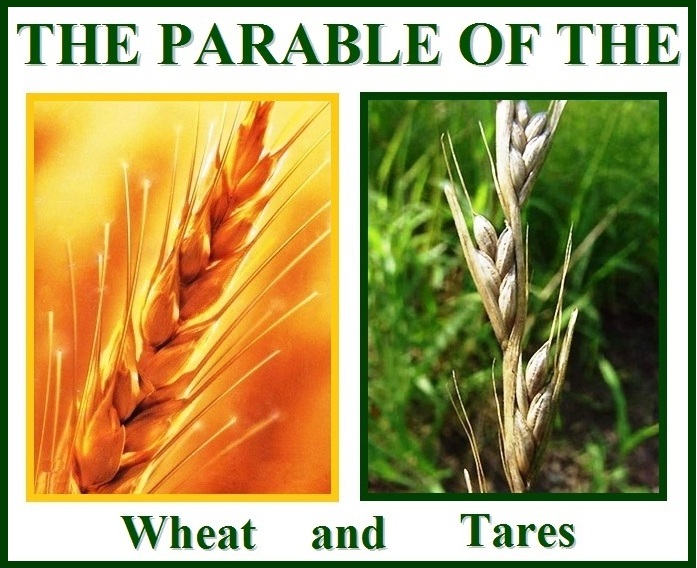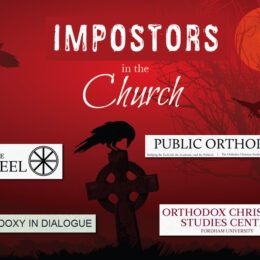 by Archpriest Victor Potapov –
by Archpriest Victor Potapov –
The devil sows tares, says the Lord, while men sleep. In other words, the devil sows his tares secretly, unnoticeably, when the guards appointed to look after the field, that is, the pastors of the Church, keep watch inadequately, and when the faithful themselves live carelessly as well and listen too credulously to impostors and false teachers.
In the parable of the sower and the seed, the discourse was about how men accept the word of God in different ways, and how this word affects men in different ways. In the next parable that of the wheat and the tares Christ speaks of the fourth portion of seed, which had fallen on good ground, and how the enemy of man’s salvation does everything possible in order to ruin that which grows in this good ground.
The parable of the wheat and the tares is extremely topical for our days, when people raise the question of the origin of evil in the world and are perplexed over the temptations, schisms and fallings away which they encounter in the Church Herself. Where should one look to find the sources of Church temptations? What is their cause? Finally, who inspires them? We shall receive the answers to these and other closely related questions in the parable of the wheat and the tares. Here is how the Evangelist Matthew sets forth this parable:
The Fathers of the Church teach that the devil counteracts Christ in everything
Having told this parable, Christ explains to the Apostles and to us that the sower of the good seed is the Son of Man, that is, He Himself; His enemy is the devil, the sower of the tares; the field is the world, throughout which His universal Church extends; the good seed are the sons of the Kingdom, the children of the Church, in whom the gracefilled seed of the word of God has taken root, penetrated the heart, and made them God’s wheat, ready for gathering into the heavenly barn, that is, for the kingdom of God; the tares are the sons of the evil one, that is, every false teacher and tempter through whom Satan does his evil work.
The Fathers of the Church teach that the devil counteracts Christ in everything. “After the prophets,” says John Chrysostom, ” false prophets appear; after the Apostles, false apostles; after Christ, Antichrist will appear.” Christ calls men to the saving truth, whereas the devil, through his servants, i.e., the false teachers and tempters, sows ruinous falsehood and errors in the minds of men, and in their hearts sows various vices, embellishing all this with similitudes of truth and goodness.
For this reason, Christ calls such men tares, who resemble the wheat in external appearance. “Until the devil sees what to counterfeit,” writes Saint John Chrysostom, “he does not begin anything and even does not know how to set to work. Therefore even now, when he has perceived that he can no longer carry off, or choke, or scorch that which has been sown and has taken root, he invents a different kind of deception, namely he sows his own seed.”
when the faithful themselves live carelessly and listen too credulously to impostors and false teachers
The devil sows tares, says the Lord, while men sleep. In other words, the devil sows his tares secretly, unnoticeably, when the guards appointed to look after the field, that is, the pastors of the Church, keep watch inadequately, and when the faithful themselves live carelessly as well and listen too credulously to impostors and false teachers.
About this, Metropolitan Philaret of Moscow writes thus: “Men sleep spiritually when they carelessly close the eyes of their mind and do not wish to gaze at the light of evangelical truth, and when, like those who dream during sleep, they do not control their thoughts and do not bridle their desires. They sleep, and in the darkness of forgetfulness of God and His law he steals in and sows his tares.” Christ, of course, knows of this, and therefore He calls His followers to be spiritually awake, to be constantly on watch.
He calls His followers to be spiritually awake, to be constantly on watch
Let us turn again to John Chrysostom: “But how, sayest thou, is it possible to remain without sleep. It is not possible without natural sleep, but without moral sleep it is possible. Wherefore, Paul also said: ‘Watch ye, stand fast in the faith’ (I Corinthians 16:13). In the following words of the parable when the blade was sprung up, and brought forth fruit, then appeared the tares also, the Lord describes with exactness the behavior of heretics: At first they conceal themselves; but when someone enters into conversation with them, then they pour out their venom. Behold,” continues Saint John, “the devil’s malice. He did not sow before, because there was nothing to destroy. But when everything is already sown, he too sows, in order to ruin that which cost the husbandman many labors. Such is the powerful enmity that the devil has displayed against Christ in everything!”
The householder sowed good fruit, but by night the enemy sowed tares there. When the first shoots appeared, he called the workers and showed them that tares are growing together with the wheat. On seeing the problem in the field, the servants asked their lord: “How could this be? After all, didst thou not sow good seed?” The servants of the householder offer to pull up the tares, so that only the useful wheat would grow. The householder decisively rejected their proposal, explaining that pulling up the tares might harm the wheat, because the tares are very similar to the wheat. One might mix them up and together with the tares pull up an ear of wheat, since the tares and wheat grow together, side by side. Their roots are intertwined, and it might turn out that by uprooting the tares, you will harm the roots of an ear of wheat, and it will perish.
O Lord! Why dost Thou not now chastise the evil?
This detail in the parable of the wheat and the tares is extremely important and topical. In the world, we see many iniquities and diverse scandals. And not only in the outside world, but also in the inner enclosure of the Church there is much that is far from well. Often, at the sight of the outrageous behavior of evil, immoral men, people say: O Lord! Why dost Thou not now chastise the evil? Why dost Thou give them the opportunity to make use of all the good things of the world? Why do they squeeze and oppress the good?
To all these questions Christ answers in the parable: “Let both grow together until the harvest: and in the time of harvest, i.e., the day of the dread judgment, I will say to the reapers, My angels: Gather ye together first the tares, and bind them in bundles to burn them (Matthew 13:30); and they shall gather out …them that do iniquity; and shall cast them into a furnace of fire: there shall be wailing and gnashing of teeth (verses 41-42). But gather the wheat into my barn (verse 30). Then shall the righteous shine forth as the sun in the kingdom of their Father (verse 43).
Many children of the Church, imagining that they are zealous for the truth and for the purity of the Church, call for the tares to be uprooted. If one starts zealously to destroy every evil within the Church, one might indiscriminately pull out an ear of wheat instead of tares, and harm oneself. The Lord decisively forbids such a means of struggling with evil, because no one except God, Who alone is the Knower of hearts, is able to distinguish the hypocrite from the righteous man without error. Moreover, many sinners may yet change, repent and become righteous. Blessed Augustine says in this regard: “Many are correcting themselves, like Peter; many are forborne, like Judas; many will not be exposed until the coming of the Lord, Who will illumine that which is concealed in darkness and will disclose the thoughts of the heart.”
Gold is purified of dross by fire.
Indeed, if we turn to the lives of the saints, we shall find many righteous who had experienced falls during the course of their life. At the moment of their fall, one might take them for tares. The Fathers teach that the presence of temptations in the world and the deeds of evil men purify the soul and help it to see more clearly it’s weaknesses, to feel more deeply its guilt, and little by little to weaken the power of sin in itself. Gold is purified of dross by fire.
The mixing of both good and evil men in the world furnishes the good with thousands of occasions to be perfected in good, to acquire patience, meekness, humility, gentleness, love. The life of the righteous on the earth is closely tied with the life of sinners, and with the bonds of kinship, and with the similarity of dispositions in the soul, and with outward circumstances, so that a jolt in the lot of some does not pass by without a jolt in the life of others. For example, an unworthy father, drunkard or profligate might carefully raise his pious children; the well-being of honest workers might be found in the hands of an avaricious and crude proprietor; an unbelieving ruler might prove to be a wise and beneficial lawgiver for his citizens. If the Lord God would punish all sinners indiscriminately, then the whole order of life on earth would be upset.
this does not mean that the Lord forbids us to stop false teachers
Moreover, Christ does not want the tares to be destroyed that are found alongside the wheat in the enclosure of the Church because he desires to teach us patience and to show sinners His loving kindness. Saint John Chrysostom says that this does not mean that the Lord forbids us to stop false teachers. It is necessary to struggle with them, but to struggle using worthy, evangelical methods. But in no case is it permissible to resort to force in this struggle, as very regrettably took place sometimes in Church history. The Holy Fathers forewarn against excessive zeal, saying: “Zeal that wants to vanquish every evil is itself a great evil,” because it can bring about much harm. The conscience of a Christian must not burn with that evil that he sees. He is called to curb the evil in himself.
Concerning the struggle with evil, Metropolitan Philaret (Voznesenskij) says well: “The Lord said: I say unto you, That ye resist not evil. Essentially, the Russian and Slavonic texts do not coincide here. ‘Evil’ is not evil as such, but the evil person. In Russian this reads: “I say unto you: do not resist an evil [person]!’ And that is all. [Translator’s note: This same translation difficulty is also found in the Authorized (King James) Version of the English Bible. In the New King James Version this passage (Matthew 5:39) is translated: “But I tell you not to resist an evil person.”] If you want to struggle with evil, then do not address yourself directly to the man who does evil, but to the evil that he causes. And do not try to pull this person out of the enclosure of the Church, as the servants wanted to pull out the tares; but rather try to convince him, try to explain to him the incorrectness of his notions. As Father John of Kronstadt said: “Sinful they are, but love the sinners and pity them.” Unreasonable zeal strives to destroy everything that causes evil. Concerning it, the Apostle Paul said that this zeal is not according to knowledge. This zeal can itself prove to be a great evil, because it can cause much harm and confusion and temptation in the midst of the Church.”
If there are tares in the Church, this does not hinder our faith and love
Christ says: “Let both grow together until the harvest,” and the harvest is the end of the age. Blessed Augustine explains: “And so the Church until the end of the age will combine within Herself the good and the evil, without harm to the good. If it turns out that there are tares in the Church, this does not hinder our faith and love; upon observing tares in the Church, we should not fall away from Her. We ourselves must only try to be wheat, so that when the wheat will be gathered into the barns of the Lord, Theophilactus, the Bishop of Bulgaria, remarks in this connection: “If Matthew (who before his conversion was a tax collector hated by his fellow countrymen V.P.) would have been wrenched from this life when he was numbered among the tares, then together with him the wheat of his word, which would subsequently sprout up from him, would have perished too. In precisely the same way, both Paul and the thief, when they were tares, were not annihilated so that subsequently their virtue would spring up.”
false teachers and tempters, sows ruinous falsehood and errors in the minds of men
Christ does not want the death of sinners, but desires that they come unto the knowledge of the truth and be saved (I Timothy 2:4). In the warmth of His goodness and in the enlivening rays of His love he wishes to soften the hardness of their hearts and arouse in them a new life (II Corinthians 5:17). He sets forth the piety of His chosen as an example for them, as a denunciation of their sinful life. Let us recall the conversion of the Saul, the persecutor of Christians. But was Saul the only one to become a Paul? How many pagans were turned into fiery confessors of the faith upon seeing the selflessness and firmness of the martyrs. And this happened not only in antiquity. In the twentieth century as well, how many people were inspired by the example of steadfastness of the new martyrs and confessors of Russia!
The Holy Fathers liken the Church of Christ to Noah’s ark, wherein there were clean and unclean animals together. Again, the Church is like a net in which various creeping things are also drawn in together with the fish. Various people both sinners and righteous make up the Church, the Body of Christ. There are in Her people who have attained the height of spiritual perfection, and there are spiritual babes. It is necessary to take care of the beginners and not to tempt and repel them as weak members of the Church through “zeal not according to knowledge.”
HT: Russian Orthodox Cathedral of St.John the Baptist.




